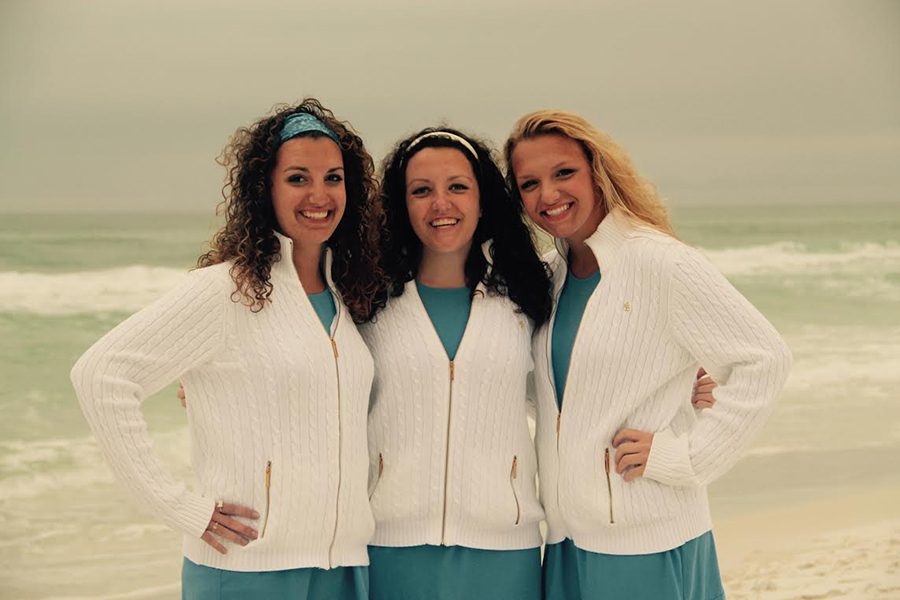Twins, triplets, quadruplets—When it comes to siblings from a multiple birth, life can easily become a game of comparisons. Who is the tallest? Who has the best grades? Who is the most athletic? Rather than asking questions to evaluate the similarities and differences between siblings, it may be time to ask if comparison can pose lifelong problems.
For junior Becky Kottmeyer, fraternal triplet to Abby and Katie Kottmeyer, comparison is a ceaseless part of life that has been around since childhood.
“Growing up, you just find all this as normal with people stopping you in public places, asking you triplet questions and peering into how you and your sisters are similar and unique. I would say the comparison has been a lifelong thing,” B. Kottmeyer said.
Although mere curiosity is the primary reason behind such comparisons, siblings often feel confined by the conceptions others may have about them.
“Most of the time, people don’t even mean anything by it; however especially in middle school and high school, I was old enough to see how being a triplet affected my relationships with teachers and friends, and that’s when it became more of a problem,” B. Kottmeyer said. “Some people really do make a good effort to see us as individuals, yet some people don’t even try.”
Not only can comparison cause problems in relations with peers and teachers, but also in relationships between siblings.
“It is common that some people disregard getting to know the other two of us if they know one Kottmeyer. People feel like they need to pick a favorite,” B. Kottmeyer said. “Comparison indirectly causes the need to be territorial of the things you are the best at. We try our best not to be competitive, but it is hard when your strengths and weaknesses are analyzed to each others’ in a school setting.”
Each sibling, however, is an individual with their own likes, dislikes, hobbies and habits.
“I’ve always been paired with my brother, but that’s kind of what being a twin is. Whether you like it or not, you’re gonna be stuck together,” junior Kentaurus Robinson, fraternal twin, said. “This didn’t start bothering me at all until we started branching out and becoming more individual, because while I still did spend plenty of time with him, I didn’t necessarily want to spend all my time with him. We’re different people, and we like doing things our own way.”
Although sibling comparison may persist from childhood into high school and beyond, incidents involving comparison can become an easy source of humor that lightens the burden of constantly being compared..
“I faced the hilarious situation where a number of people I knew had mistaken me for both myself as well as my twin,” K. Robinson said. “They hadn’t met my brother, who looks completely different from me, so in many cases, people thought I was both [my brother] Chiron and myself.”
However, this same humor may not be funny to the siblings themselves. For B. Kottmeyer, issues were aplenty during a class shared with her sister, Katie.
“Right after a couple weeks of school, they had the class take bets on which sister would do better on their test than the other one, [which] not only exploited our grades but made us, as people, into a game,” B. Kottmeyer said. “That class was not my strength, but that does not go to say that I am not smart. That experience made me feel discouraged by my teacher and insecure around my classmates.”
Even through all of the ups and downs, twins, triplets, quadruplets and all other kinds of siblings from a multiple birth can list the merits of having siblings of the same age.
“We know what is going on in the other classes and are able to remind each other things about school, like a project or homework. Also, I don’t think either of us like to go into new things alone. It make me less nervous to have someone around that I know well,” freshman and identical twin Alison Clay said.
And in the eyes of multiples, relationships with their siblings certainly have the tendency to win out against all else.
“I adore being a triplet and I would not change it if I had the chance. I like having two people to walk besides me in life rather than to look up to or coach down to,” B. Kottmeyer said. “Both of them are really smart, so if I ever have a school question they are there. If I ever need a pick me up, they are there because most likely they know what I am going through.”
B. Kottmeyer implores peers to consciously work to not compare herself and her sisters.
“In this world we are trained to look for connections. It is what really smart people do; [they] sort out similar colors, identify different patterns, be able to find friends based off of your similar personality. So when people hear we are triplets they want to answer whatever question comes to mind and either put us in or take us out of a box,” B. Kottmeyer said. “We should be seen as individuals with variant commonalities.”




![Gazing across the stage, sophomore Alexis Monteleone performs in the school theater. The Monteleone family’s band “Monte and the Machine” has been releasing music since 2012, but Alexis started her own solo career in 2024 with the release of her first single, Crying Skies. “My whole family is very musical, [and I especially] love writing [songs with them],” Monteleone said.](https://pwestpathfinder.com/wp-content/uploads/2025/09/DSC7463-1200x798.jpg)
![Amid teaching a lesson to her AP Calculus BC class, Kristin Judd jokes alongside her students in their funny remarks. Judd has always enjoyed keeping the mood light in her classroom, along with on the volleyball court. “[I enjoy] that side talk where you see [or] overhear a conversation and chime in, or somebody says something funny,” Judd said.](https://pwestpathfinder.com/wp-content/uploads/2025/09/image-1200x730.jpg)
![Eyeing the ball, junior Ella McNeal poses for her commitment pictures at Clemson University. McNeal’s commitment comes after months of contact with top Division 1 soccer programs. “ It has taken a lot to get to where I am, but I know that [what] I've already been through is just the beginning, and I can't wait for what is to come,” McNeal said.](https://pwestpathfinder.com/wp-content/uploads/2025/09/IMG_4926-1200x900.jpeg)


![Senior Adam Zerega stands with senior Dexter Brooks by farm equipment. Zerega often worked with friends and family on his farm. “I've been able to go to my family's farm since I was born. I [spend] at least three weekends a month [on the farm], so I'm there all the time,” Zerega said.](https://pwestpathfinder.com/wp-content/uploads/2025/04/IMG_4872-1200x900.jpg)

![Phage grown by senior Rio Naghibi Harat sit in petri dishes. Through Webster University, Naghibi Harat was given the opportunity to develop phage as a potential remedy for tuberculosis. “Phage are everywhere. I got mine from a soil sample. I'm not kidding; I picked [it] up from dirt. They're harmless, unless you code them to do something, and they can evolve. Virus antibiotics can't. They're one solid molecule. A strain of this bacteria [can evolve] that is resistant to [a] particular drug, [but] phage will evolve with the bacteria. They can see the changes, and they can be the change,” Naghibi Harat said.](https://pwestpathfinder.com/wp-content/uploads/2025/04/Flag-2.png)
![Hosting a meeting for Women’s History Month, co-president Bethany Liao converses with club members of Women in Healthcare. The event fostered discussions about women in medicine and included a third year medical student from Bosnia as a guest speaker. “Creating this club has been a net positive experience for everyone. After we present [or a guest speaker], we [also] usually have snacks for everyone and it gives people an opportunity to generally talk or discuss,” Liao said.](https://pwestpathfinder.com/wp-content/uploads/2025/04/DSC0032-1-1200x800.jpg)
![Leaning on the podium, superintendent Melissa Schneider speaks to Parkway journalism students during a press conference. Schneider joined Parkway in July after working in the Thompson School District in Colorado. “My plan [to bond with students] is to get things on my calendar as much as possible. For example, being in [classes] is very special to me. I am trying to be opportunistic [meeting] kids [and] being in [the school] buildings. I have all the sports schedules and the fine arts schedules on my calendar, so that when I'm available, I can get to them,” Schneider said.](https://pwestpathfinder.com/wp-content/uploads/2025/09/IMG_5425-1200x943.jpeg)

![Leaping through the air, senior Tyler Watts celebrates his first goal of the season, which put the Longhorns up 1-0 against the Lafayette Lancers. Watts decided to play soccer for West for his last year of high school and secured a spot on the varsity roster. “[Playing soccer for West] is something I had always dreamed of, but hadn’t really had a good opportunity to do until now. It’s [really] fun being out [on the field], and I’m glad I decided to join the team. It’s just all about having fun with the boys and enjoying what time we have left together,” Watts said.](https://pwestpathfinder.com/wp-content/uploads/2025/09/DSC_1951-1200x855.jpg)

![Junior Fiona Dye lifts weights in Strength and Conditioning. Now that the Trump administration has instituted policies such as AI deregulation, tariffs and university funding freezes, women may have to work twice as hard to get half as far. "[Trump] wants America to be more divided; he wants to inspire hatred in people,” feminist club member and junior Clara Lazarini said.](https://pwestpathfinder.com/wp-content/uploads/2025/05/Flag.png)
![As the Trump administration cracks down on immigration, it scapegoats many immigrants for the United States’ plights, precipitating a possible genocide. Sophomore Annabella Whiteley moved from the United Kingdom when she was eight. “It’s pretty scary because I’m on a visa. When my visa expires next year, I’m not sure what’s going to happen, especially with [immigration] policies up in the air, so it is a concern for my family,” Whiteley said.](https://pwestpathfinder.com/wp-content/uploads/2025/05/DSC_0077-7copy.jpg)
![Shifting global trade, President Donald Trump’s tariffs are raising concerns about economic stability for the U.S. and other countries alike. “[The tariffs are] going to pose a distinct challenge to the U.S. economy and a challenge to the global economy on the whole because it's going to greatly upset who trades with who and where resources and products are going to come from,” social studies teacher Melvin Trotier said.](https://pwestpathfinder.com/wp-content/uploads/2025/05/MDB_3456-1200x800.jpg)

![Pitching the ball on Apr. 14, senior Henry Wild and his team play against Belleville East. Wild was named scholar athlete of the year by St. Louis Post-Dispatch after maintaining a high cumulative GPA and staying involved with athletics for all of high school. “It’s an amazing honor. I feel very blessed to have the opportunity to represent my school [and] what [it] stands for,” Wild said.](https://pwestpathfinder.com/wp-content/uploads/2025/05/unnamed-6-1200x714.jpg)
![Red, white and blue, the American flag holds the values of our democracy. The fight that we once endured has returned, as student journalists and senior correspondents across the country are losing their voices due to government control. “[Are] the White House and [the] government limiting free speech [and] freedom of the press? Yes [they are],” chief communications officer of the Parkway School District and former journalist Elisa Tomich said.](https://pwestpathfinder.com/wp-content/uploads/2025/03/Untitled-design-14.jpg)
